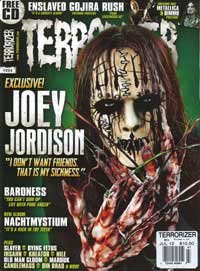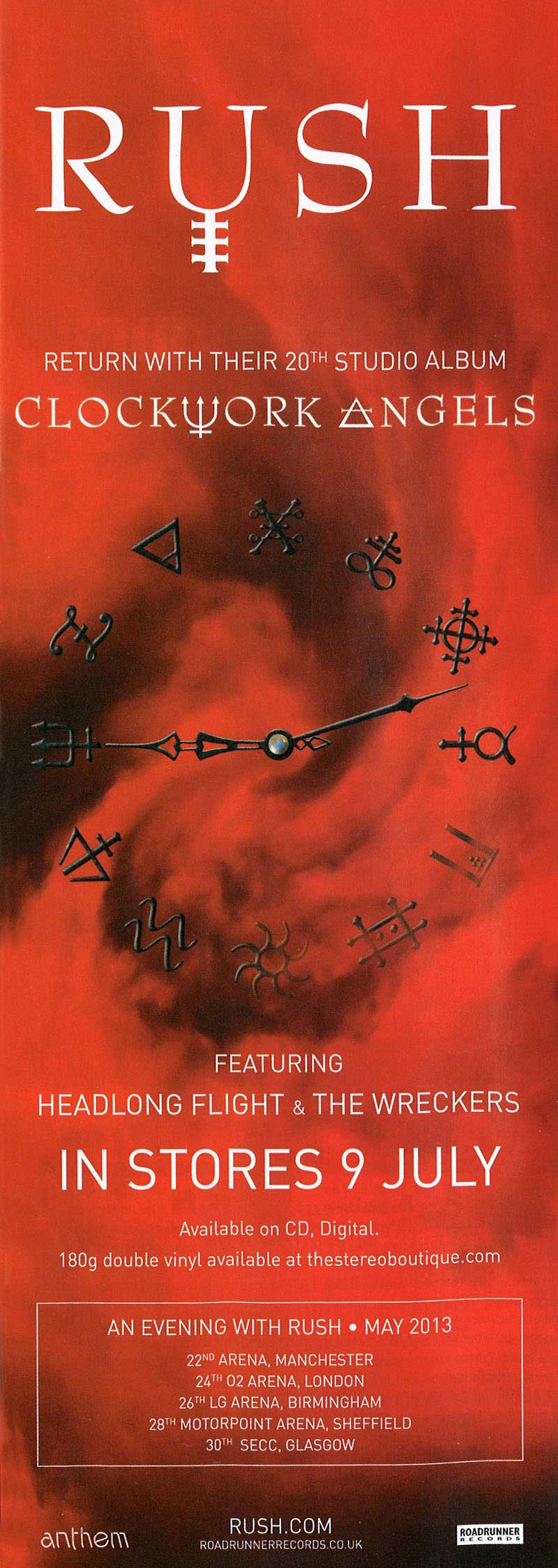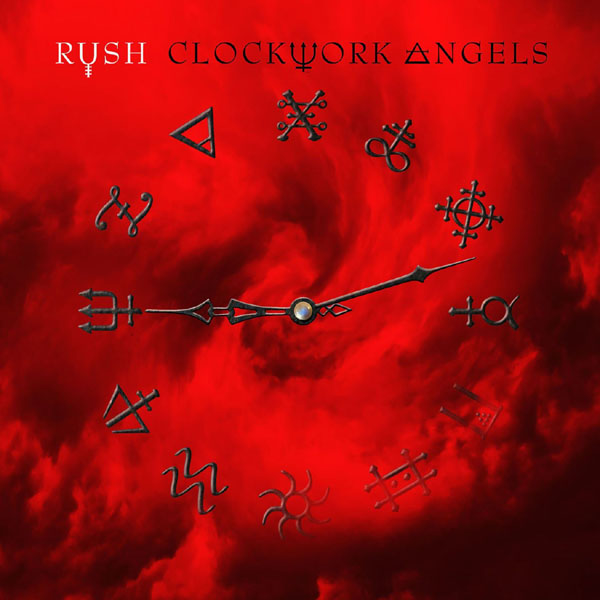Times Of Grace
ON THE WINGS OF ANGELS: 40 years, 40 million album sales and a brand spanking new album to boot. We get our prog jog on!
By Lee MacBride , Terrorizer, July 2012, transcribed by John Patuto

Geddy Lee has traversed a career full of many highlights with his band Rush. But the singer still feels there is much more time left on the clock.
For the best part of 40 years Rush frontman Geddy Lee has steered the Canadian trio on an individualistic slipstream through the rock cosmos, achieving over 40 million album sales along the way. Influenced by an anarchic world of steampunk and alchemy, the bands 20th opus 'Clockwork Angels' details the voyage of a young man's encounters in a strange and vibrant world via a lyrical collaboration with bestselling Sci-fi author Kevin J. McDonald [sic]. With no signs of stopping and soon to be hitting bus pass age, the unassuming singer talks to Terrorizer in his luxurious ĢI400-a-night suite in London's five-star Milestone Hotel and begins to reflect on his own achievements and the sacrifices he's had to undertake for success.
You grew up in the moon landing generation. How did your parents feel when you started Rush?
"I lost my father when I was very young, so he was never around to see my career happen or not happen, and he would have probably done his best to stop it from happening. My mum on the other hand did her best to stop it from happening. She thought I was out of my mind. As far as she was concerned, it was like running away to join the circus. She's a Holocaust survivor, an immigrant that moved to Canada after the war, starting a life with her husband who passed away and then her son, a young teen, wants to run away and make this crazy noise. So, it was very hard for her to accept and of course through the years I've been fortunate to be successful, and now of course she's a proud mum and brags all the time."
You must have made some personal sacrifices for such a successful career?
"I think the sacrifices are all family-based, like time away from my kids. That's hard, and it affects them, no question. I have a great relationship with my kids, but I missed a lot of their lives, and I'm sure they've felt that one way or another. My wife's done an amazing job with them and I've tried to be there when I can. Also, she's sacrificed a lot in her life, the career which she had, in order to be that parent that was consistent. My daughter came along a little bit later in life, and my wife had a career as a fashion designer at that time, and because my career was in full throttle, she didn't want me to give up what I was doing so she took it upon herself to take that role on and that changed her life, and that's a huge sacrifice on her part for the sake of my career. Those are the kind of sacrifices that are only worth mentioning."

Do you ever regret that she had to make that decision?
"I don't regret my career in that sense, because it is what it is. You can't go back and change anything. I've learned a lot, I've had a great ride, and if it was all to stop tomorrow, I really don't have any regrets. I really regret the fact that my wife has had to sacrifice a lot for my career, I regret the fact that my kids spent less time with me than I would have liked, but you cannot go back in time and change those things either. I'm just fortunate that I have a great relationship with those people. I'm still married to the same woman who I adore and my kids are awesome and very accomplished, so it worked out for me, but there was a price, and they paid it more than I did."
It's a hard thing to balance...
"Listen, being married is the hardest job on earth, and if you're in a rock band it makes it even harder. I always feel for the guys that are in a studio like producers and engineers, because it's even harder for them, in a way, because they're there but they're not there. They're living at home but they're at the studio all the time. They're at the mercy and whims of the artists they're working with, whereas at least if you're a musician and you go away, you're out of sight, the people left at home can build their life and do what they need to do without worrying, 'Is he here? Is he not here?' At least when I get a break, I can be home probably more than they want me to be home, so they get a chance to have a few months with me, get sick of me and send me on my way again [laughs]. Anyway, it's all part and parcel of what we are willing to sacrifice to do the work that we love to do."
Rush have appealed to generation after generation and you mentioned that you strive to stay current. So, what modern bands appeal to you?
"Good question. I have a good friend who turns me onto music, and that's probably the best thing a person can have in their life, because they've got their ear to the ground and my ear has been away from the ground for quite a while now [laughs]. Fleet Foxes for example, I love them. I think they're awesome. A really talented band. They're really strange; they remind me of Amazing Blondel or one of those bands. They have fantastic vocals, and yet really delicate playing. It's hard to do that. I've always loved the Foo Fighters, I think they're a great contemporary rock band. Queens of the Stone Age, Josh is a great guitarist and a real talented guy."
What about Rush's bloodline into the more dexterous forms of rock, like Dream Theater?
"It's not my cup of tea. I appreciate what they do, but I don't find myself listening to them. Every once in a while The Mars Volta will find its way onto my box, and I love watching them, cause they're wild! They're really incredible players. They really have that nailed."
So you prefer energy over technicality, then?
"I appreciate the technicality but I like it when it's energetic, and if I'm going to listen to a young band I want them to knock me down. But you know, as I get older, I appreciate melody writing probably a bit more than I used to. I'm drawn to that more melodic side and some of the bands I mentioned all have a very strong melodic sense. As far as progressive rock is viewed today, it's surprising to me that it's being welcomed back. But I think you're right, there are certainly many places I've been that have seen a resurgence of interest in progressive rock."
The key to prog's survival is the fact that it takes a lot from everywhere else, it's diverse, and the artists within that bracket strive for individuality...
"Really well said. I couldn't agree with you more. That's exactly how I view it, and I think those bands we mentioned have that. Strong individually, but still diverse, interesting, willing to experiment. I think that breaks you away. When you start repeating yourself in that kind of mould, and stop bringing light into it, then I think you're losing that progressive edge. Rupert Hine, who produced a couple of our records, used to disagree with us being a progressive band, he used to consider us a post-progressive band or 'PP rock' as he would say." [laughs]
What are your thoughts on revisionism in music?
"I think that's normal. It's hard to see what's really good at the moment, and the decider is time itself. Take painters for example: so much contemporary art in every period in history, and how do you know that this is a great artist or not a great artist? Only time is going to tell you that. So in 50 years time, if that art still means something to someone, then obviously there's a resonance that transcends the moment, and maybe that's the same with this revisionist thing; we're re-examining that period to see if there was something truly valid, is there something more than just style, or was there some substance for us to appreciate although we have moved into a different period. So I would think that's the only point of revisionism, and that's a very positive thing."
Prog was very uncool at points, especially in the late '70s when punk came along...
"Punk got so hip and punk was so simple that it legitimised us. At that time we were considered a rather crude progressive band, compared to the masters like Yes and Genesis, we were kinda at the crude spectrum of that. Yet, punk immediately elevated us into accomplished musicians since most of them couldn't play. So, seeing us in context of that and then seeing us in the context of today is quite different. Maybe that's another side-effect that makes revisionism essential in a way; so you can keep checking in with that period and asking what can we bring from that period into our period today."
It's now 100 years away from 2112. Do you think we're any closer to fulfilling the album's prophecy?
"[Laughs] I have no idea. Life is so unpredictable. Even ten years ago, could we have imagined the kind of world we live in now? I know that when I was making that record, could I have ever imagined that I'd be walking around with a small computer in my hand that enables me to do all the things that I can? And that changes the world, that changes the way we communicate, changes everything, and it's probably going to be faster in the next 15 or 20 years. I really think it's impossible to guess. Maybe that's why there's science fiction. Maybe that's why science fiction is fun, because we exercise that part of their brain that makes them wonder what that's all going to be about and where we're going to end up. I remember reading '1984' when I was younger, and 1984 didn't look like that at all in reality, so it's just impossible to see!"
Has there been a bane in your career?
"We've made mistakes, we've written some bad songs, but that's all part of it. I don't regret them. I've always professed that you learn way more from your errors than you do from your victories, and I think our less successful records have always taught me much more than our most successful records, because you can see and it forces you to examine that thing. When it's not successful or doesn't stand the test of time, you have to ask yourself why; what can I learn from that that I can apply to the next thing?"
You've accomplished so much, is there anything left?
"I'm a busy guy, I have a great life, but there's always something else to do. There's always another piece of music to write, there's always more art to appreciate. The world is full of wonder you just have to want to gaze at."
Clockwork Angels Album Review

Although 'Clockwork Angels' could be the sonic cousin of 2002's 'Vapor Trails', producer Nick Raskulinecz has made vast improvements to the band's sound and captures the trio's spirit and ambition perfectly. For those already familiar with singles 'Caravan' and 'BU2B', it is fair to say these are representative of the music of Rush in 2012.
Alex Lifeson's guitar work is sometimes spacey, often heavy, always tasteful; Geddy Lee remains the bass player against whom others are measured. Neil Peart's peerless percussion has been rethought and continues to stun. 'Clockwork Angels' is a delight and leaves no doubt that Rush remain a cohesive band with a shared creative vision. Make room in your 'Top 5 Rush Albums' list for a new record.
-MIRANDA YARDLEY